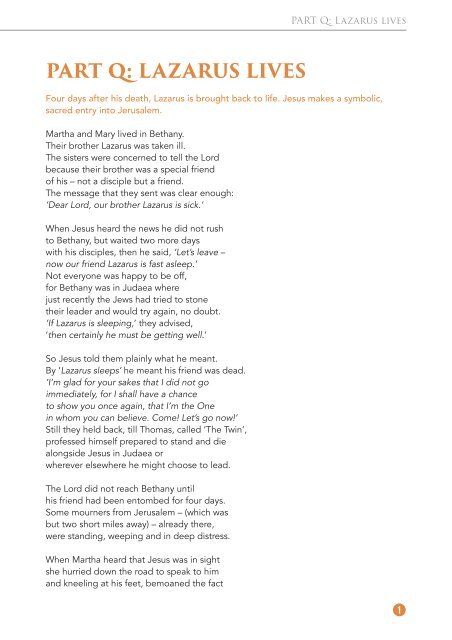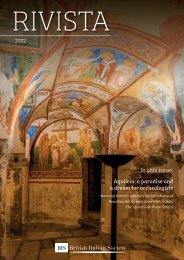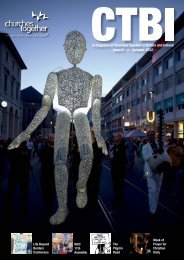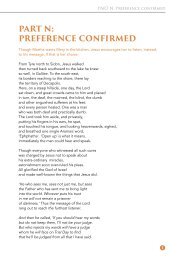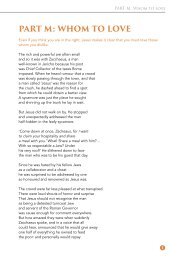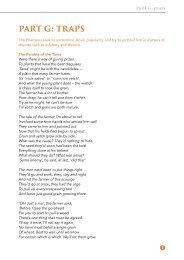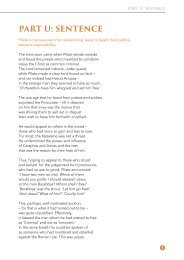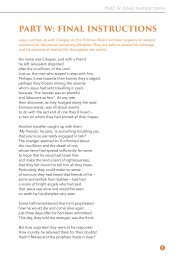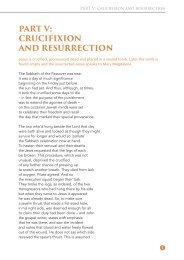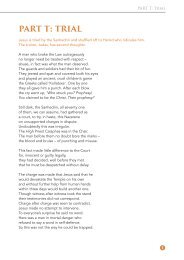You also want an ePaper? Increase the reach of your titles
YUMPU automatically turns print PDFs into web optimized ePapers that Google loves.
<strong>PART</strong> Q: Lazarus lives<br />
<strong>PART</strong> Q: LAZARUS LIVES<br />
Four days after his death, Lazarus is brought back to life. Jesus makes a symbolic,<br />
sacred entry into Jerusalem.<br />
Martha and Mary lived in Bethany.<br />
Their brother Lazarus was taken ill.<br />
The sisters were concerned to tell the Lord<br />
because their brother was a special friend<br />
of his – not a disciple but a friend.<br />
The message that they sent was clear enough:<br />
‘Dear Lord, our brother Lazarus is sick.’<br />
When Jesus heard the news he did not rush<br />
to Bethany, but waited two more days<br />
with his disciples, then he said, ‘Let’s leave –<br />
now our friend Lazarus is fast asleep.’<br />
Not everyone was happy to be off,<br />
for Bethany was in Judaea where<br />
just recently the Jews had tried to stone<br />
their leader and would try again, no doubt.<br />
‘If Lazarus is sleeping,’ they advised,<br />
‘then certainly he must be getting well.’<br />
So Jesus told them plainly what he meant.<br />
By ‘Lazarus sleeps’ he meant his friend was dead.<br />
‘I’m glad for your sakes that I did not go<br />
immediately, for I shall have a chance<br />
to show you once again, that I’m the One<br />
in whom you can believe. Come! Let’s go now!’<br />
Still they held back, till Thomas, called ‘The Twin’,<br />
professed himself prepared to stand and die<br />
alongside Jesus in Judaea or<br />
wherever elsewhere he might choose to lead.<br />
The Lord did not reach Bethany until<br />
his friend had been entombed for four days.<br />
Some mourners from Jerusalem – (which was<br />
but two short miles away) – already there,<br />
were standing, weeping and in deep distress.<br />
When Martha heard that Jesus was in sight<br />
she hurried down the road to speak to him<br />
and kneeling at his feet, bemoaned the fact<br />
q
A gospel in blank verse with rhymed parables<br />
that he had come so late. ‘Had you been here<br />
when he was still alive, my brother would,<br />
I’m sure, be breathing still: but even now<br />
I know that what you ask of God will come<br />
about.’ ‘Your brother Lazarus will rise<br />
again,’ said Jesus. ‘Oh, I know that he<br />
will rise again, as all will rise, upon<br />
the Day of Resurrection,’ Martha said.<br />
‘I am the Resurrection and the Life.<br />
He who believes in me, though he should die<br />
will yet live on; and he who lives and still<br />
has faith in me will never die. Is that<br />
what you believe?’ ‘Yes, Lord’, she said, ‘I do:<br />
and I believe you are the Christ, the One,<br />
who’s come into the world, the Son of God.’<br />
Then quickly leaving Jesus, she went back<br />
to find her sister Mary in amongst<br />
the folk who’d come to mourn their brother’s death.<br />
‘The Lord is here’, she whispered, ‘and would like<br />
a word.’ So Mary quietly slipped away:<br />
but those who saw her leave assumed that she<br />
was going to the tomb of Lazarus<br />
to grieve there, so they followed her and saw<br />
how she too, sobbing, fell upon her knees<br />
before the Lord and cried, ‘Had you been here<br />
our brother would have lived!’ And Jesus wept<br />
to see how overcome the mourners were<br />
and how the sisters, quite beside themselves,<br />
were giving way to sorrow and despair.<br />
‘Please show me where you’ve put him’, Jesus said<br />
and weeping still, was taken to the cave<br />
which served as tomb. Some bystanders were heard<br />
to say how much the death of Lazarus<br />
would seem to have affected him. A few<br />
were critical. ‘This man works miracles.<br />
If he can give a blind man sight, why not<br />
arrive in time to keep a friend alive?<br />
By then the Lord had reached the tomb. A stone,<br />
as was the custom, had been used to block<br />
the entrance and to seal it off from thieves.<br />
‘Remove the stone,’ said Jesus, ‘right away.’<br />
But Martha raised her voice in protest. ‘Lord,’<br />
she said, ‘he has been dead for four days.<br />
w
<strong>PART</strong> Q: Lazarus lives<br />
His body may be rotting and the place<br />
will smell’. ‘Martha,’ he said, ‘did I not say<br />
to you that if you would believe, you’d see<br />
God’s glory yet again revealed.’ And so,<br />
reluctantly, they took away the stone.<br />
Then Jesus raised his eyes to heaven and said<br />
‘I thank you, Father, that you’ve heard me speak.<br />
I know you always listen when I call.<br />
I shout aloud, so those who’re standing by<br />
may know for certain that I come from You<br />
and am your Chosen One.’ At this he raised<br />
his voice and shouted, ‘Lazarus! Come out!’<br />
And Lazarus walked out, his hands and feet<br />
all bound in linen strips, a burial cloth<br />
close wrapped around his face. He needed help.<br />
‘Unbind him,’ Jesus said, ‘and set him free.’<br />
What Jesus did for Lazarus became<br />
well-known throughout the whole of Israel<br />
and many came to Bethany to see<br />
the man who had been brought back from the grave.<br />
The interest in Jesus therefore grew<br />
and many Jews began to follow him.<br />
The Pharisees’ response was to decide<br />
that Lazarus must die a second time.<br />
They plotted how they might put both to death.<br />
The Chief Priests and the elders, all were told.<br />
Here was a man who posed a constant threat<br />
– an upstart, yet the name on every lip –<br />
a critic who could trounce them in debate<br />
who conjured signs and marvels by the score.<br />
Two days before the feast of Passover<br />
the priests and elders called a conference:<br />
and first on their agenda was to seek<br />
some way of dealing with the Nazarene.<br />
They thought his presence at the public feast<br />
was certain. Why not have him seized and killed?<br />
The problem was he seemed so popular<br />
That to arrest him might provoke a riot<br />
especially at that time of festival.<br />
They feared that they might have to shoulder blame<br />
and argued that they dare not take that step.<br />
e
A gospel in blank verse with rhymed parables<br />
The High Priest, Caiaphas, berated them.<br />
‘But if you just ignore him, the result<br />
might be that everyone will follow him.<br />
Our way of life might be in jeopardy.<br />
The Romans might well use him as excuse<br />
to undermine our very nationhood.<br />
Do not you understand that we are bound,<br />
however serious that step might be,<br />
to do whatever we might have to do<br />
to safeguard all our people – our whole race<br />
our culture, history, and identity?<br />
One man shall pay the price that saves us all.’<br />
Many believed that High Priests sometimes were<br />
channels of prophesy. It was a gift<br />
God-given with their holy offices.<br />
On this occasion such belief is seen<br />
to have been surely fully justified.<br />
With no clear understanding what he’d meant<br />
The High Priest prophesied the Lord would die<br />
not only for the Hebrew race, but all<br />
of us… for men and women everywhere!<br />
Wherever Jesus was, there was a crowd –<br />
well not quite always, but it was a fact<br />
that what he had to say and what he did<br />
assured him of a ready audience.<br />
The Scribes and Pharisees were often there.<br />
They only followed in the hope that he<br />
would say or do something to undermine<br />
his popularity. They were the few.<br />
The vast majority were on his side:<br />
his actions and his words delighted them.<br />
This made it difficult for those who wished<br />
to have the Lord arrested, tried and killed.<br />
The Temple Officers would find themselves<br />
attacked if they dared lay a finger on<br />
so popular and well-beloved a man.<br />
Then, unexpectedly they were approached.<br />
Judas Iscariot, one of the Twelve<br />
appeared and said he was prepared, for cash,<br />
to tip them off at some time when the crowds<br />
had all dispersed. The Pharisees agreed.<br />
r
<strong>PART</strong> Q: Lazarus lives<br />
Who knows why Judas should betray the Lord?<br />
We are not certain how he got his name!<br />
Perhaps his birthplace had been Karioth:<br />
Iscariot may be a soubriquet,<br />
a name acquired after the event<br />
with the double meaning of ‘betrayer’<br />
and, unexpectedly, ‘deliverer’.<br />
Certain, it is, he sought out the Chief Priests<br />
and offered to make easy an arrest.<br />
The deal was done. The priests had cause to crow.<br />
Something symbolic in the price they paid<br />
made self-congratulation apposite.<br />
It was the forfeit that the Law required<br />
if any Hebrew murdered his own slave.<br />
All Judas had to do was tell them when<br />
Jesus could be arrested out of sight,<br />
away from public gaze.<br />
The Feast of Passover came round again<br />
and Jesus seemed intent on going south.<br />
Though all of his disciples lagged behind<br />
he strode ahead towards Jerusalem.<br />
All were afraid he’d be in danger there<br />
and for themselves they’d reasonable fears.<br />
So Jesus told them all to gather round.<br />
‘You know that men of old had much to say<br />
about the Son of Man: and soon we’ll see<br />
how right their prophesies will prove to be<br />
for he must fall into the hands of those<br />
Chief Priests and Scribes who will deliver him<br />
to be condemned to death the Roman way.<br />
The Son of Man will suffer mockery,<br />
be spat upon and treated shamefully:<br />
and finally he will be crucified.<br />
But, three days afterwards, he will arise<br />
and leave his tomb.’ But none of this made sense<br />
to any of the Twelve. Their minds were closed.<br />
At last the hour came for the Lord to star<br />
upon his journey to Jerusalem<br />
and leaving Galilee he made his way<br />
towards Judea, and, as usual,<br />
crowds followed in his footsteps all the way<br />
to listen to his teaching and be healed.<br />
t
A gospel in blank verse with rhymed parables<br />
Now, Jesus rarely travelled on his own<br />
and usually sent messengers ahead<br />
to warn each village of his near approach<br />
especially if he meant to stay the night.<br />
On this occasion, some Samaritans<br />
refused him welcome since it was quite clear<br />
his destination was Jerusalem<br />
to worship there. This was the crux of all<br />
the disagreements that divided Jews<br />
from those who called Samaria their home.<br />
For James and John the insult was too much.<br />
They wanted retribution straight away.<br />
They asked the Lord if they might not call down<br />
brimstone and fire from the skies to kill<br />
those in the village who’d not welcomed him.<br />
But Jesus was severe in his rebuke<br />
and made it clear in no uncertain terms<br />
that they should simply find another place<br />
to stay the night.<br />
It was the week before the Passover<br />
when Jesus, travelling to Jerusalem,<br />
called in for supper with the family<br />
of Martha, Mary and of Lazarus.<br />
He was the man whom Jesus brought to life<br />
although he’d been entombed for four whole days.<br />
Perhaps by way of thanks, while Martha served,<br />
her sister Mary took some spikenard –<br />
a pint or thereabouts – which she began<br />
to use to spread upon her guest’s bare feet.<br />
The house was filled with fragrance by the cream –<br />
its perfume so pervasive and intense<br />
that his disciples were quite overcome –<br />
except for one – Judas Iscariot.<br />
“That ointment would be worth a year’s wage,<br />
to any labourer,” he said. “What waste!<br />
We might have giv’n the money to the poor.”<br />
But Jesus intervened. ‘Let her alone.’<br />
To Mary he said, ‘Please don’t use it all.<br />
y
<strong>PART</strong> Q: Lazarus lives<br />
It can be used, when need be, on the day<br />
of my own burial. The poor will still<br />
be with you – you’ll have them: but you will not<br />
always have me among you, as I am,<br />
today. The hour is getting late.’<br />
The Chosen People’s’ pride and sacred home,<br />
Jerusalem , the Jewish capital,<br />
was for the Lord, the cause of much distress.<br />
It was with sorrow that he spoke of it:<br />
for prophets who’d been sent to help it find<br />
a better way to serve the Living God<br />
had always been ignored or stoned to death.<br />
He often spoke of it regretfully<br />
as if God were a mother hen who tried<br />
to constantly protect her errant chicks<br />
by offering them the safety of her wings<br />
to only have her proffered help refused.<br />
‘For now,’ he said, ‘there is no help at hand,<br />
nor will there be until you say to me,<br />
“Here is the One who has been blessed by God<br />
and in His Name He comes to visit us.”’<br />
When they were very near Jerusalem<br />
and walking through a village called Bethphage,<br />
Jesus despatched two messengers ahead.<br />
They were to fetch a foal for him to ride<br />
and, in the village they could see close by<br />
they’d find just what he wanted, out of doors,<br />
and tethered fast. They must release the foal.<br />
Should they be questioned what they were about –<br />
untying a young donkey not their own –<br />
they must reply ‘The Lord has need of it<br />
and will return it to you very soon.’<br />
Tied to a door out in the open street<br />
the two disciples found the foal and did<br />
as Jesus had commanded, at which point,<br />
– again as he’d predicted – they were stopped.<br />
The owners wished to know what they were at.<br />
‘Jesus the Healer needs it for himself<br />
but do not fear, we’ll bring it back to you.’<br />
This was enough to satisfy the men.<br />
Without demur they watched it led away.<br />
u
A gospel in blank verse with rhymed parables<br />
And thus, on loan, this donkey’s foal, this colt,<br />
as yet un-ridden and untried, was brought<br />
to Jesus and a sort of saddle made<br />
of cloaks and other garments spread upon<br />
its back. So, when he’d mounted it and rode<br />
towards Jerusalem, then everyone<br />
with clothes to spare, discarded them to make<br />
his way as smooth as possible – to cheer,<br />
to honour and to celebrate a man<br />
who had brought health and hope and miracles<br />
wherever he had gone. ‘Blessed is he,’<br />
they cried, ‘who comes to us in God’s own name.’<br />
Yet Zechariah had foretold all this:<br />
‘Come! Shout aloud! Your king is on his way:<br />
patient and meek and riding on a colt.’<br />
So now ‘Hosanna’ was the cry. ‘The King<br />
of Israel is on his way, whose deeds<br />
and mighty works we’ve all seen for ourselves.’<br />
Those close to him could see he was in tears<br />
and speaking to the city (as it were)<br />
he said, ‘If only at so late an hour<br />
you recognised that peace and sinlessness<br />
are indivisible. But you are blind:<br />
and one day every enemy you have<br />
will threaten and blockade and capture you.<br />
The buildings people look upon with pride<br />
will be demolished and reduced to dust<br />
and your inhabitants all left for dead.<br />
Why so? Because you did not recognise<br />
just Who it was had come to visit you’.<br />
i


